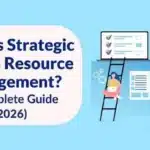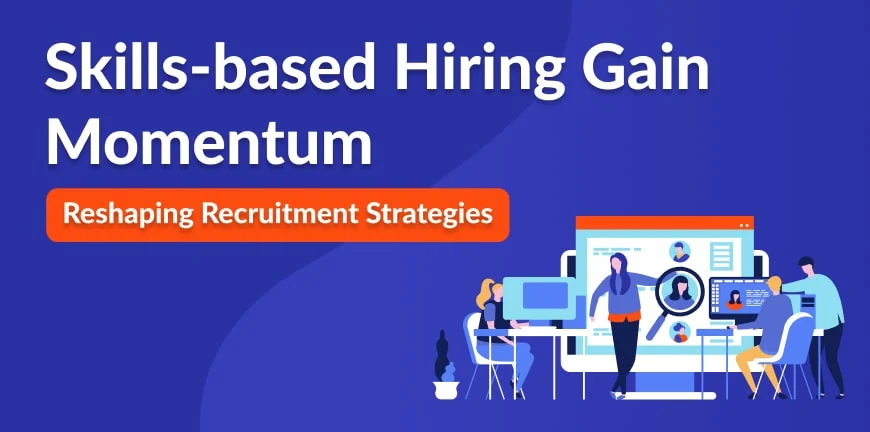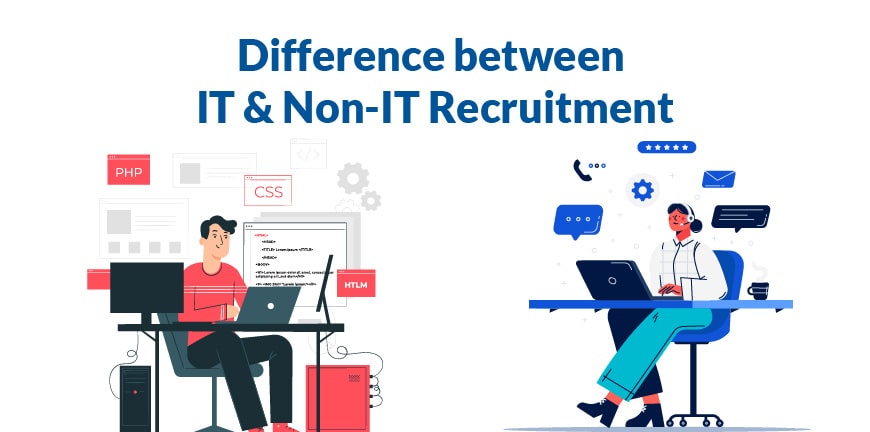
What Is a Contingent Workforce? Benefits & Strategies in 2026
17/04/2025
What is Safety Compliance – Meaning, Benefits, and Best Practices
21/04/2025In a blistering paced job market, yesterday’s skills cannot match the demands of tomorrow. Degrees and fancy job titles no longer grab the spotlight. The skills that you possess matter the most in today’s competitive world.
Most dynamic organizations have realized it and are redefining the rules by recruiting talent based on real-world impact and not just resumes. This skills-based recruitment has revolutionized the way organizations function in identifying, empowering and elevating top tier performers in every industry.
81% of employers globally are utilizing skills-based hiring in 2024, up from 73% in 2023 and 56% in 2022.
From Credentials to Competencies
Traditional recruitment models have prioritized degrees, certifications, and chronological experiences for the longest time. But with sectors like tech, healthcare, finance, and manufacturing evolving rapidly, employers have discovered that a resume does not tell the full story all the time.
The modern approach enables recruiters and hiring managers to tap into a wider and more diverse talent pool, entailing career transformers, self-taught professionals and others who follow non-traditional paths.
Traditional hiring practices are mostly dependant on surface-level indicators including degrees, job titles and the reputation of past employers. It’ is an approach which is a formulaic entrenched in assumptions that credentials alone demonstrate capability.
This thought process is challenged by skills-based hiring which delves deeper not what matters than what a candidate’s resume says on paper, it is the applicant’s intent and their ability to perform, adapt, and flourish in the role.
It does not matter anymore where an individual studied or the name of their previous employer; it is about the skills they have or have developed over the years that they present and how they align with the requirements of the business.
At a time where big conglomerates are deciding to drop degree requirements, it is not very smart to hold on to traditional hiring methods and risking overlooking incredible talent. Skills-based recruitment welcomes a more diverse adaptable workforce determined based on real abilities.
The radical shift to skills-based hiring not only caters to the business demands of today but also sets the success stage for organisations in a rapidly evolving world. There is no reason why to stick to a model that neglects capable candidates.
What are the Reasons Behind Gaining Traction?
1. Widening the Talent Pipeline
With talent shortage continuing to malign industries across the globe, one impactful approach is shifting the focus from traditional credentials to demonstrated capabilities and practical know-how.
This shift is helping organizations to uncover latent talent and tap into a wider talent network where they can discover individuals with excellent skills to excel but may have been eliminated due to outdated hiring criteria.
These candidates might be self-taught developers, military veterans, career changers, gig workers, or people who attained expertise through non-traditional ways like apprenticeships, freelance work, etc.
By recruiting candidates based on skills, companies can fill roles faster in strained labour markets, enhance workforce diversity by removing obstacles for entry, access fresh perspectives with adaptable mindsets driving to build stronger, skills-aligned teams prepared to perform.
2. Fast and Efficient Hiring
Evaluation based competency like coding challenges, simulations and portfolio reviews are rewriting how employers assess talent. Unlike traditional interviews or résumé screenings, these practical assessments offer a direct window into a candidate’s real-world skills and problem-solving approach.
Focusing on the skills of candidates, employers gain a clear picture about clearer and more objective insights resulting in faster and prompt hiring decisions, as performance data gains more traction than guesswork, high-quality hires, aligned with real job requirements alleviates bias as assessments concentrates on outcome over background, expedited onboarding outcomes, as new hires are often upbeat about performance.
3. Alignment with Business Needs
By aiming at specific, measurable skills, organizations can create robust performance-driven teams that caters quickly to the evolving business demands. Employers now can identify the exact capabilities required for a project or role and not rely on broad job titles or generic experience.
This can include proficiency in a specific programming language, fluency in data analysis tools or customer engagement strategy expertise. This approach enables teams to get better aligned with business goals from the get-go.
They have the right tools and expertise to perform better send contribute meaningfully, pivoting swiftly as priorities shift. In challenging environment with short innovation cycles and rapidly changing market conditions, this level of adaptability is a game-
4. Robust DEI Outcomes
Shifting focus to demonstrable skills and competencies, organizations are supporting and helping the candidates from non-traditional, historically marginalized backgrounds entailing self-taught professionals, career changers, veterans, and individuals who gained experience through unconventional career paths.
Removing stringent credential requirements along with widening the talent pool actively promoting equality and inclusion in the recruitment process. There is an influx of a more diverse, innovative, and strong workforce.
Teams created from real-world skills presents a plethora of perspectives and experiences that fosters enhanced problem-solving abilities, deeper empathy for customers, and stronger business outcomes.
What are the Key Enablers of Skills-Based Hiring?
There are several emerging trends and tools supporting the rise of skills-based hiring. Let us look at some of the trends.
1. AI-Driven Platforms
Organizations are using advanced technologies with AI powered tools to attract candidates with job roles based on skills rather than resumes.
2. Micro credentials and Digital Badges
There is a rise in demand for short form learning programs among employers on platforms like Coursera, LinkedIn Learning, etc.
3. Internal Skills Marketplaces
Companies are heavily focusing on mapping internal employee skills. It is a strategic move that aims at staying agile, innovative, and competitive.
Challenges to Overcome
Skills based employment has its benefits but comes with several challenges as well. Let us look into some of the challenges:
1. Skill Validation
Today with a competitive job market, it is difficult to ensure that the candidates possess the skills and expertise they claim than it may initially seem. Cover letters, resumes, and interviews often don’t give us the full and real picture. This might create a considerable gap between what is perceived and what the real competence is resulting in serious implications for businesses.
2. Managerial Mindset
The traditional hiring landscape had an affinity for a university degree which served as the epitome of ability, discipline, and potential. But today in this evolving economy fuelled by technology, innovation and agility, the real deal is skills and not just credentials. Embracing this change is not easy and might take some time, intention, and cultural transformation.
3. Scalability
Skills based hiring is proving to be extremely beneficial however, it is not that simple to scale these practices in large organizations or across multiple departments. Organizations would require developing effective skill assessments and tracking systems on a broader level and that can be resource-intensive involving strategic investment and coordination.
The Future of Hiring is Skills-First
Skills based recruitment is not just a trend but a strategic shift. It is making a headway from the static degrees to real-world potential. It is agile fairer building teams who are not only take on the world today but are prepared for whatever comes tomorrow. Change is a constant in this world and individuals possessing the ability to learn, adapt, and evolve will make it to the top.
Organizations embracing the shift are unlatching talents broadening their reach becoming winners this talent-driven economy.
Contact Us For Business Enquiry

Amit Saproo
Amit Saproo is the Head of Operations at ALP Consulting with nearly 17 years of experience in Executive Search, RPO, Leadership, and IT & Engineering recruitment. He leads nationwide recruitment programs across Technology, BFSI, and R&D domains, driving strategic hiring solutions for diverse client needs. Amit excels in building and managing high-performance teams that deliver scalable, end-to-end recruitment and consulting services.




